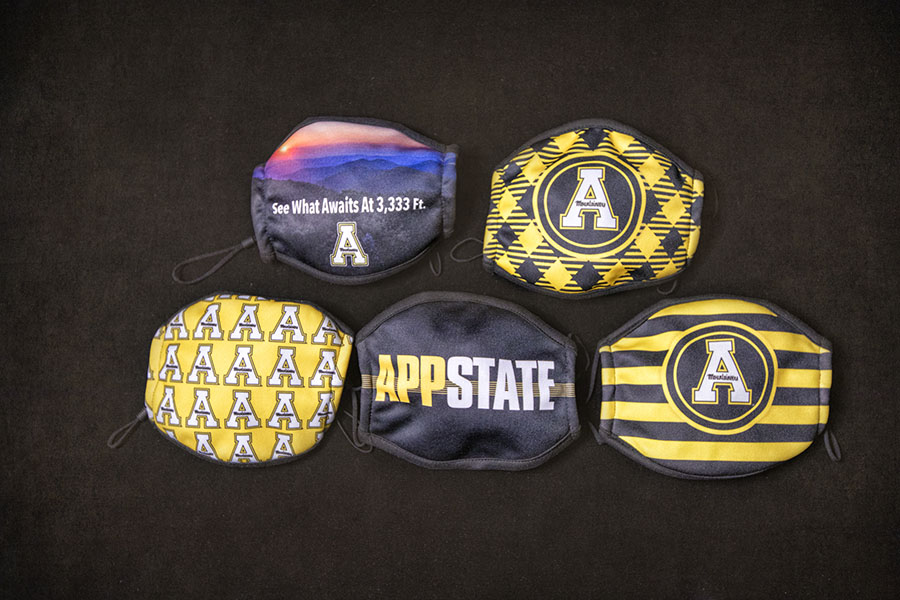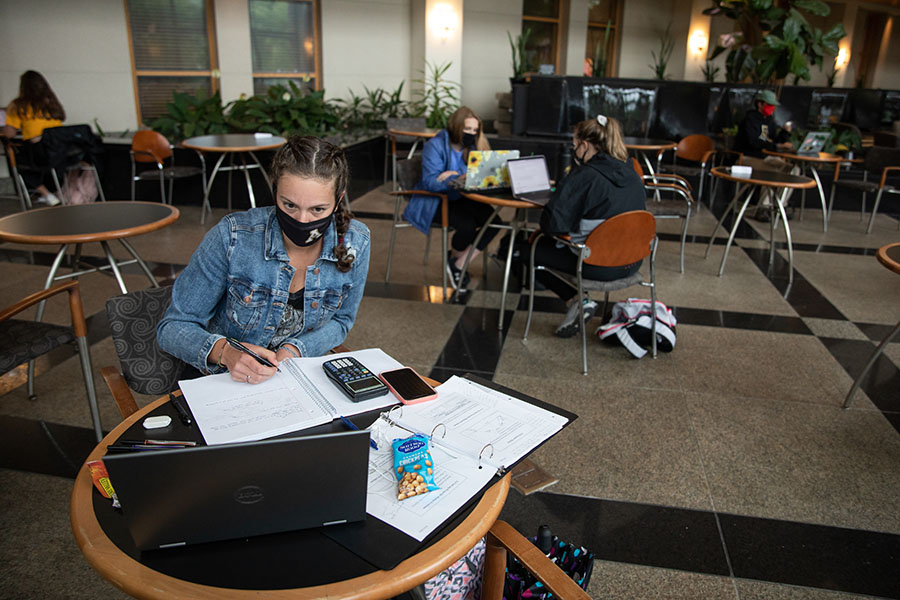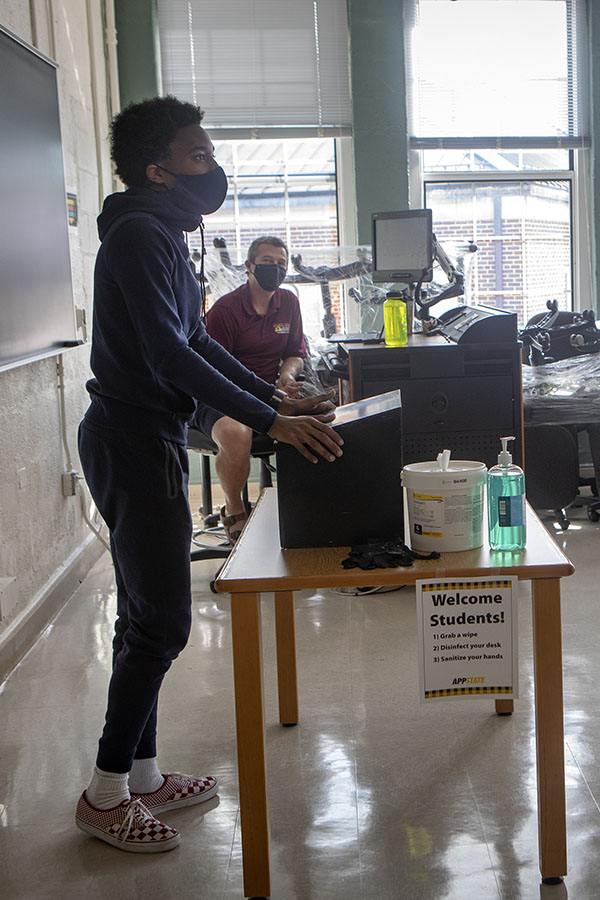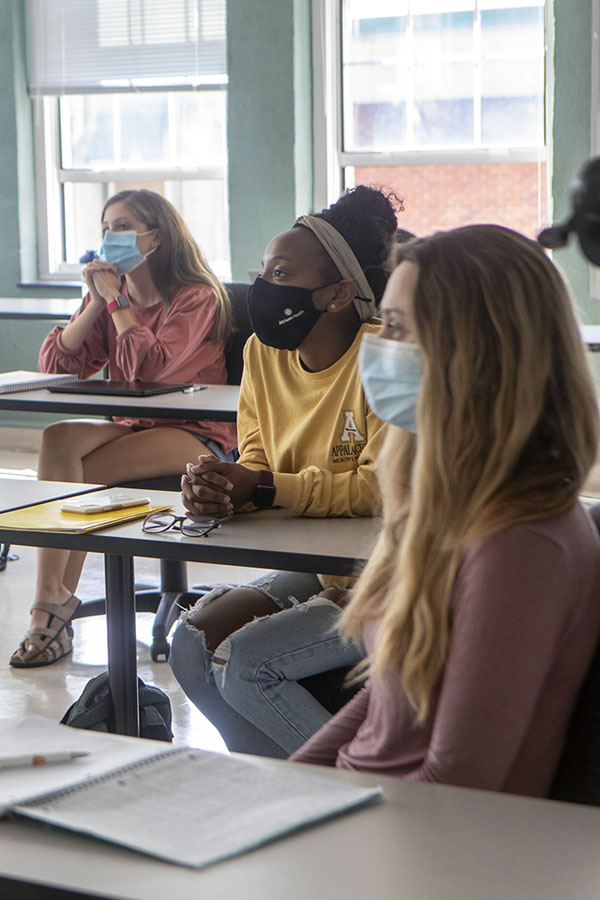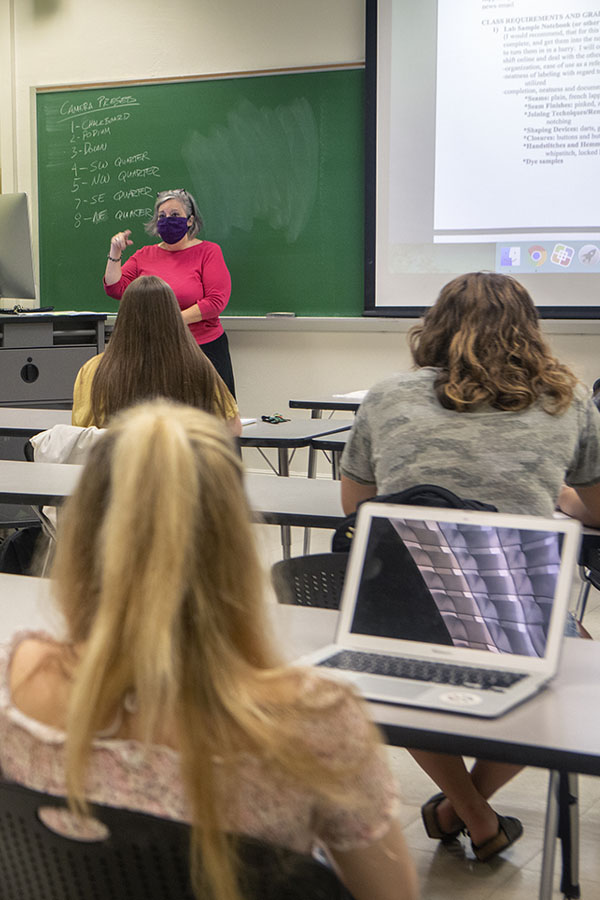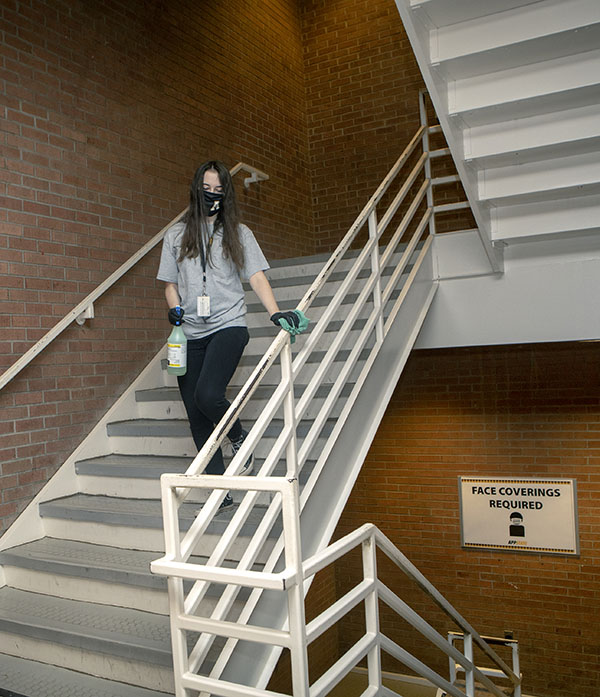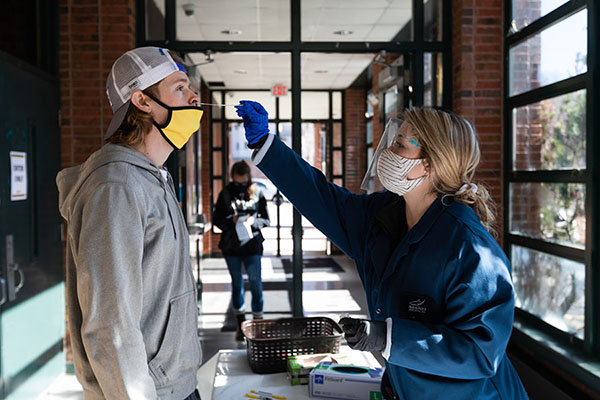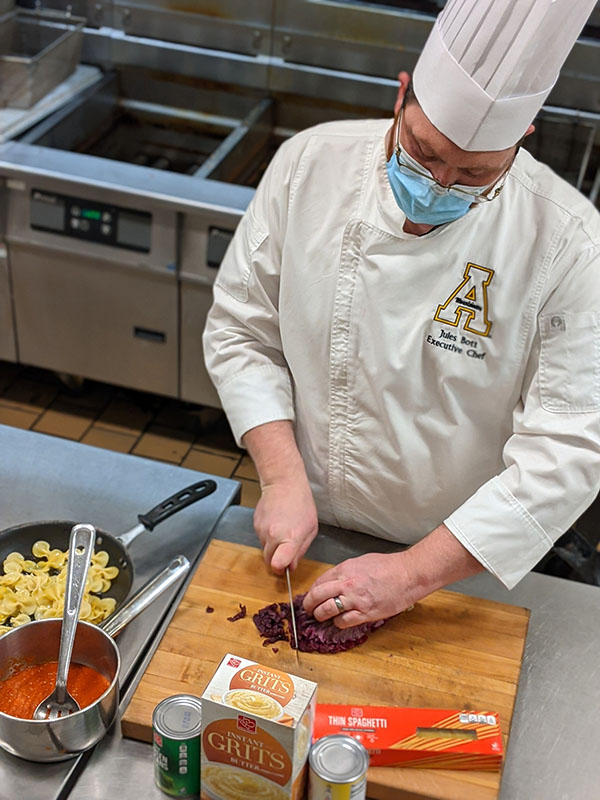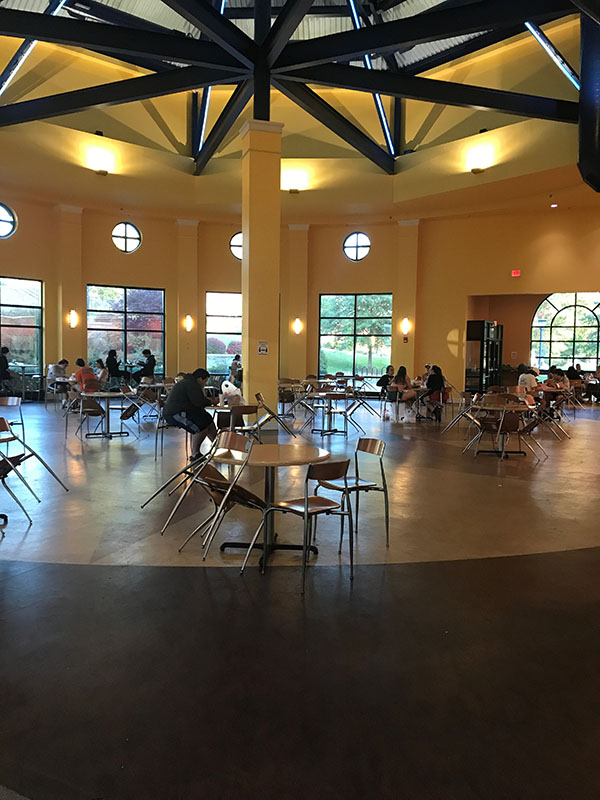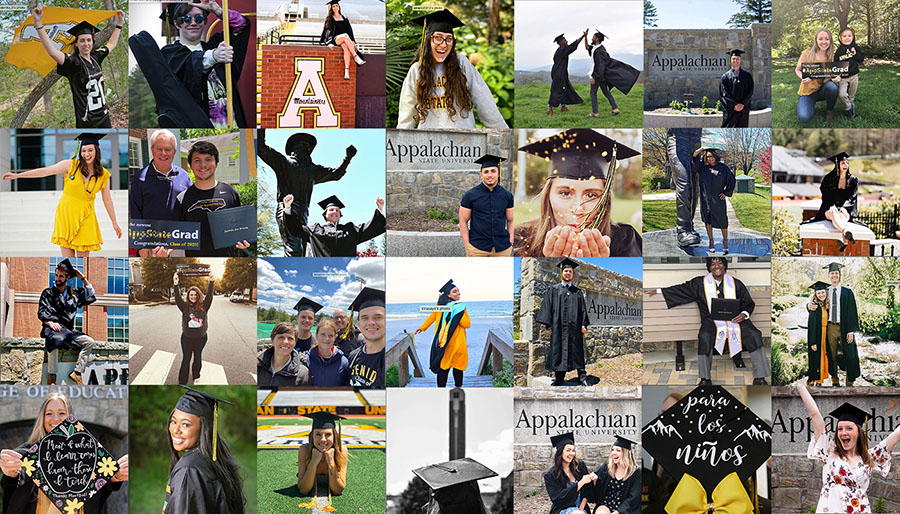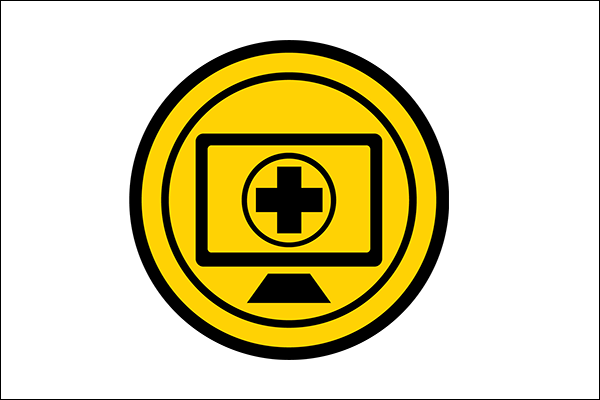BOONE, N.C. — Three hundred and thirty-five days ago, Appalachian State University began its COVID-19 campus planning discussions, and on March 1 it formally activated its emergency operations center to coordinate preparedness, response and recovery efforts.
Since then, the university has coordinated a universitywide response, guided by App State Chancellor Sheri Everts, to the global COVID-19 pandemic that has involved every department at App State, as well as agencies across the town, region and state. The campus remained open, continuing to deliver instruction remotely, in-person and using hybrids of both methods. Faculty and staff adapted classes, events and experiences to continue App State’s academic mission as safely as possible.
In March, in response to orders given by the University of North Carolina System and North Carolina Gov. Roy Cooper, App State, along with all UNC System institutions, pivoted to remote working and learning for the spring 2020 semester.
The university developed policies, processes and strategies for managing a pandemic “over the course of a few short weeks,” Everts said. “We re-built an entire university infrastructure — even as we were using it. We faced new unknowns and increasingly difficult challenges each day.”
Everts continued, “Our faculty and staff have earned our thanks for ensuring the greatest possible continuity for our students as well as for their colleagues. I am especially appreciative of our students’ adherence to precautionary measures in place to prevent the spread of COVID-19.”
Throughout the pandemic, as the data related to COVID-19 have evolved, Cooper has enacted a series of executive orders focused on gathering limits, requirements for face coverings and recommendations for travel. App State has modified its emergency operations in accordance with these orders.
In August, App State’s faculty, staff and students returned to campus for fall 2020 with enhanced safety measures in place; these included required daily health assessments and face coverings and regularly held surveillance testing events.
“Though the enormity of this pandemic’s impact is staggering, we have a structure in place that gives us the key data we need to make informed decisions,” Everts said.
The university worked individually with faculty, staff and students to make needed adjustments to course delivery methods — with 45% of classes taught in hybrid or fully face-to-face formats and 55% of classes delivered fully remotely. Additionally, App State reduced density in its residence halls to 73% by allowing students to opt out of their housing contracts.
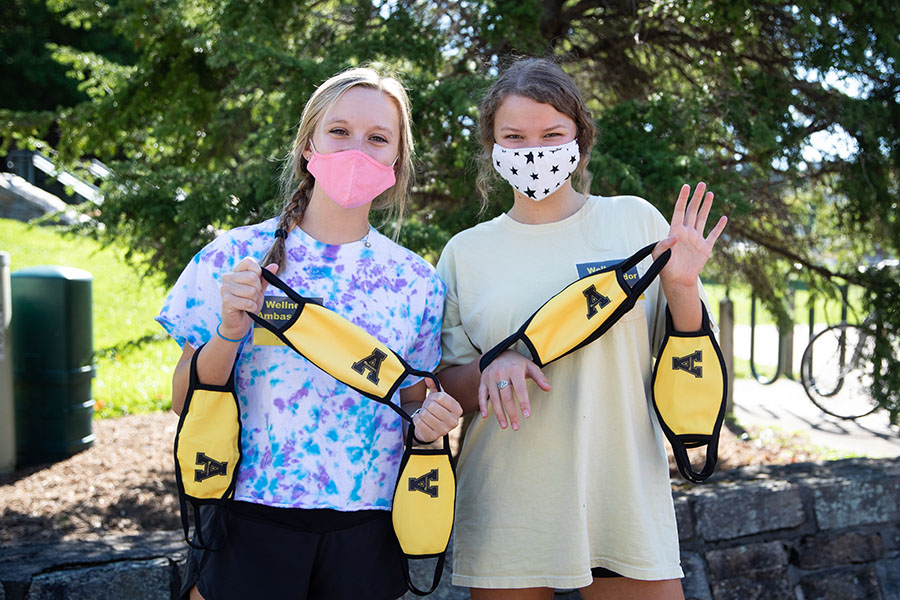
During fall 2020, Appalachian State University students developed and supported peer accountability programs to encourage members of the Appalachian Community to comply with safety precautions related to COVID-19. Pictured are Wellness Ambassadors Melina Tirrell, left, a sophomore social work major from Pineville, and Jessica Phillips, a sophomore finance and banking major from Charlotte, handing out face coverings. Photo by Chase Reynolds
While some personnel faced furlough, Everts prioritized re-assigning employees to other areas. After three dining facilities closed due to low demand, the staff were re-assigned to assist with COVID-19 response efforts — delivering COVID-19-related supplies to campus units, helping with testing site logistics and providing courier services for students in quarantine by delivering food, hygiene items, laundry and medication, as well as class assignments.
An operations team led by App State Vice Provost Mike McKenzie ’99 and App State Associate Vice Chancellors Matt Dull and Nick Katers coordinated more than two dozen project-specific planning teams that assembled in the spring and developed and executed their plans throughout the summer and fall.
Adapted working environments
This spring — over the course of two weeks — App State worked to move 2,600 course sections from face-to-face instruction to online learning and facilitated a system of teleworking for more than 2,150 faculty and staff. Throughout 2020, App State had no confirmed cases of classroom transmission of COVID-19.
“COVID-19 has challenged all of us to think differently. App State’s faculty members have prioritized a quality academic experience for our students,” said Dr. Heather Hulburt Norris, interim provost and executive vice chancellor. “They continue to innovate with and learn from one another, staying meaningfully engaged with their students and colleagues.”
McKenzie, who serves as dean of App State’s Cratis D. Williams School of Graduate Studies and vice provost of academic program management and strategic initiatives, said over the summer, with the help of the university’s Center for Academic Excellence (CAE), faculty further developed online courses for fall 2020 to be as engaging as in-person classes.
“Many faculty had never taught in a hybrid or an online environment prior to March,” McKenzie said.
During fall 2020, Appalachian State University held 45% of classes in a hybrid format or face to face. The university implemented safety precautions in its classrooms, as shown here, including required face coverings and physical distancing. Photos by Marie Freeman
To help faculty transition to online instruction, the CAE identified approximately 50 key faculty, known as faculty champions, to provide technical and instructional support to their colleagues.
“This process provided a path forward for those faculty with experience teaching online and hybrid courses to mentor those whose courses were developed for in-person instruction,” McKenzie said. “We did everything possible to accommodate the health and safety of our students and still deliver the high-touch educational experience our students crave.”
Thesis defenses took place via Zoom. Several professors used video to simulate classroom experiences. A professor in the Department of Geological and Environmental Sciences filmed petrology samples as they would have been seen by students under the microscope, and other faculty members from the department recorded field mapping work students would have experienced in person throughout the semester.
Addressing mental and physical health
App State’s Dr. Alex F. Howard, interim assistant vice chancellor in the Division of Student Affairs and director of the Department of Wellness and Prevention Services, was instrumental in working to adapt student services associated with physical, mental and emotional well-being. Howard’s background in public health and his team of student wellness educators were key to planning and implementing the university’s student wellness initiatives.
“Staff across the university have maintained their commitment to student-focused advocacy and the delivery of high-quality student support services,” Howard said. “The ongoing presence of the pandemic has exceeded the timelines that many projected,” he explained, “further exacerbating the strain and stress experienced by students, in particular, during this time.”
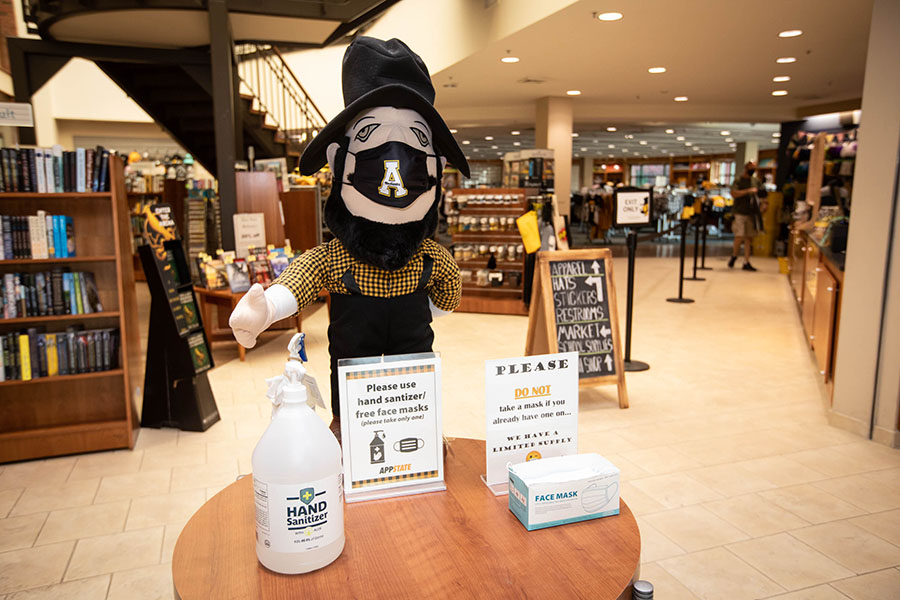
In response to the COVID-19 pandemic, Appalachian State University implemented enhanced safety precautions across campus, including daily health checks, required face coverings and hand sanitizer stations. Signs, like the ones pictured in the University Bookstore, were posted throughout campus to remind faculty, staff, students and campus visitors of the health and safety guidelines in place. Photo by Marie Freeman
As with academic support, wellness support for students has been continually refined, and his area continues to seek feedback from students in an effort to improve the quality of existing services.
The pandemic sparked the creation of a variety of support systems:
- App State partnered with AppHealthCare to create the #ShowYourLove public health campaign featuring billboards, avenue banners, AppalCART ads, newspaper ads, and local radio and TV spots featuring Chancellor Everts, Student Government Association President Michael Davis and SGA Vice President Cameron Hunter, and many other App State students. The university also ran ads on 90.5 WASU-FM, App State’s radio station, encouraging students and the community to adhere to safety precautions.
- Over the spring and summer months, more than 100 App State staff members personally called nearly 16,000 incoming and current students as part of the Mountaineer Connect campaign to see how they were doing and connect them to any needed resources.
- Student Wellness Ambassadors encouraged their peers to follow safety precautions by handing out face coverings and rewarding students who were following precautions with coupons to campus facilities.
- Students in App State’s Psychology Club and chapter of Psi Chi, the national honor society in psychology sponsored by the American Psychological Association, developed the App State vs. COVID campaign, through which students used a mobile app to observe and anonymously report safety-related behaviors using a model of “no name, no blame, no shame.”
- App State’s Student Government Association promoted adherence to guidelines related to COVID-19 by modeling appropriate behaviors and through public service announcements and social media campaigns.
- App State’s M.S. Shook Student Health Service began offering virtual visits through Zoom to allow continued access to its services for students who were on and off campus.
- Faculty and staff have access to free counseling services through App State’s Counseling for Faculty and Staff and financial assistance through the university’s Employee Assistance Program.
- App State also provided support to the campus and the local community — shared in more detail below — through meals, personal protective equipment and financial support.
Collaboration and communication
“This pandemic necessitates the utmost cooperation with our community partners, and we are fortunate to have strong relationships with organizations throughout the town, county and region,” Everts said.
According to Jason Marshburn, App State’s director of environmental health, safety and emergency management, “Members of App State’s Emergency Management Task Force have worked in coordination with university departments and our community partners since January 2020 to prepare for and respond to COVID-19.”
He continued, “The strong partnerships maintained with our internal and external partners are the foundation of the university’s successful response efforts and go back to many years of planning, training and conducting emergency exercises together.”
App State has coordinated its COVID-19 response with the University of North Carolina System, and university leaders meet twice weekly with the North Carolina Department of Health and Human Services (NCDHHS) COVID response team and daily with local public health agency AppHealthCare.
App State was one of the first universities to launch a COVID-19 Dashboard, which was updated daily throughout the fall semester in concert with local public health. Faculty advisers helped refine data presentation, and App State’s dashboard earned the second-highest ranking among North Carolina institutions on a ranking tool created by two professors at the Yale University College of Medicine.
“Because of our relationship with the AppHealthCare team, we have a much fuller picture we can use as we make data-driven decisions about health and safety on our campus,” Marshburn said.
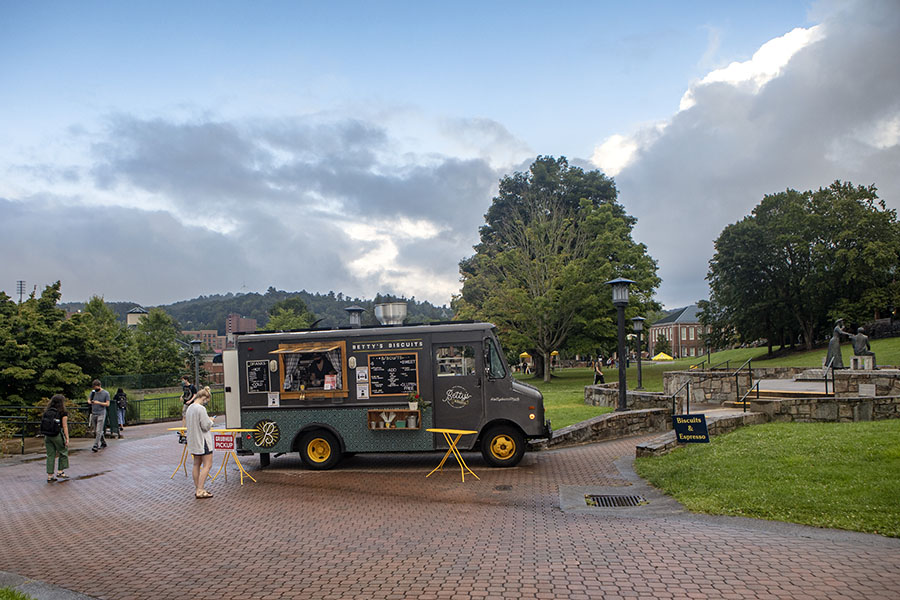
During fall 2020, Appalachian State University’s Campus Dining implemented safety precautions such as adding hand sanitizer stations and discontinuing the use of the self-serve salad bar. Campus Dining also expanded its offerings — including a Grubhub pickup location and local food trucks — to ensure students had a variety of ways to access meal options. Photo by Marie Freeman
The university created a detailed coronavirus website, which provides campus operations information as well as all COVID-related messages communicated to campus. These include Everts’ weekly messages to students, faculty, staff, families and leaders across the state, and COVID-19 operations updates that are also sent to campus at least once weekly. Everts communicates monthly with App State alumni.
App State’s Environmental Health, Safety and Emergency Management team developed protocols for surveillance testing, off-campus isolation and quarantine, and data collection. The university required face coverings to be worn on campus, daily health assessments to be submitted before coming to campus or leaving a residence hall, and physical distancing to be in place.
The university distributed more than 97,000 washable, reusable face coverings to faculty, staff and students, and shared recommendations from the NCDHHS regarding face coverings. Consistent with this guidance, App State is in the process of providing each faculty, staff and student with five new reusable face coverings for spring 2021, redesigned with an adjustable ear loop and three-ply construction.
In fall 2020, the university administered 31,293 COVID-19 tests to students, faculty and staff — representing the majority of the tests administered in Watauga County — with an overall positivity rate of 2.82%, as of Dec. 21.
Helping those in need
App State has offered support to Mountaineers and those in the local community who are in need, providing financial assistance, food, medical supplies and personal necessities.
The university has provided more than 15,000 meals to those App State and community members in isolation and quarantine and through the Meals for Mountaineers program, and coordinated with AppHealthCare to donate 200 disposable surgical masks. App State’s Campus Dining created the Meals for Mountaineers program to offer free, chef-inspired meals to those in need in the Appalachian Community during winter break — no questions asked. As of Dec. 18, more than 5,000 meals had been requested.
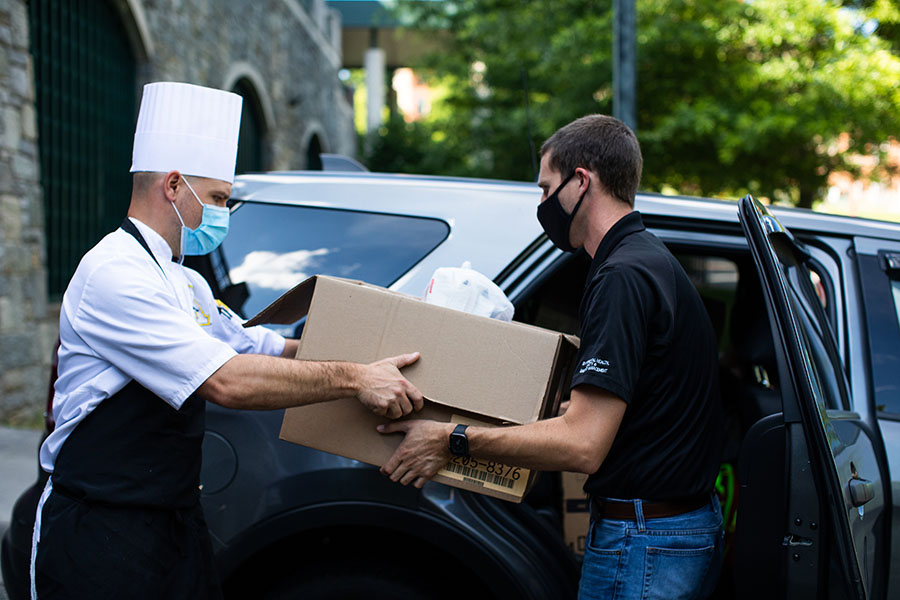
Jon Young, chef de partie in Appalachian State University’s Sanford Commons, left, and Jason Marshburn, App State’s director of environmental health, safety and emergency management, load a vehicle for a meal delivery. Since COVID-19 began, the university has delivered more than 14,000 meals through Appalachian’s Campus Dining to students and community members under isolation and quarantine and through its Meals for Mountaineers program. Photo by Chase Reynolds
“Appalachian plays an important role in the health of the community,” Marshburn said. “Our community partners have assisted the university during previous times of need, and we want to do the same for them whenever possible. Maintaining strong partnerships is vital for navigating current and future challenges.”
App State created the Mountaineer Emergency Fund to provide grants to students who are struggling with significant, sudden financial emergencies. As of Dec. 14, $6,361,922.48 in direct aid had been awarded to 10,257 students who met U.S. Department of Education criteria for a CARES Emergency Grant since spring 2020. An additional $7,963,966 in aid for App State was used for student housing and dining refunds.
Additional federal funding from the Coronavirus Aid, Relief, and Economic Security (CARES) Act is providing grant assistance to the university in the form of direct aid to students. App State’s total CARES allocation is approximately $16 million, with half providing assistance for the university and half dedicated for students. The university began distributing these grants to students in April.
Reimagined celebrations and events
“This year, we have adjusted to new ways of celebrating the important moments in our lives and, moreover, we clearly recognize the importance of doing so,” Everts said.
In accordance with statewide gathering limits, App State transitioned a number of its in-person events to virtual platforms — from the Appalachian Energy Summit and numerous other lectures and performances, to Founders Day and homecoming celebrations.
The university hosted two virtual commencement ceremonies in May and December. The ceremonies included remarks by Everts, undergraduate and graduate students, and keynote alumni speakers Stephen J. Dubner ’84, an award-winning author, journalist and radio and TV personality, in May and WBTV News anchor John Carter ’79 in December. Award-winning country music star and Mountaineer Luke Combs contributed a special performance as well. Collectively, the events garnered more than 34,000 views from 40 states and eight countries.
The university also made the arts accessible online. “The Schaefer Series Presents …” and An Appalachian Summer Festival hosted events virtually, the Turchin Center for the Arts created virtual tours of its galleries and the Hayes School of Music used software and loaned equipment to students to help them continue to progress in their performances.
University Recreation also created opportunities for students to access fitness classes, yoga, weightlifting, individual and dual intramural sports and special events — all adjusted to accommodate safety precautions.
Researching the effects and impact of COVID-19
The COVID-19 pandemic inspired specific research at App State.
Everts said, “We are only beginning to see the effects the novel coronavirus will have on our region, our state, our nation and our world. Our faculty are adept at exploring local issues within a global context and preparing our students to do the same.”
- Nearly 40 faculty representing about a dozen disciplines developed research clusters to generate information, knowledge and solutions surrounding the impacts of COVID-19 on the community and region.
- Dr. Sandi Lane, associate professor in the Department of Nutrition and Health Care Management, compiled data on the effects of COVID-19 on nursing homes across the state of North Carolina.
- Dr. Brooke Christian, assistant professor in the A.R. Smith Department of Chemistry and Fermentation Sciences, has co-authored research that could yield a more cost-effective storage and delivery method for drugs and vaccines that eliminates the need for refrigeration.
- A study by a multidisciplinary team of App State researchers and the North Carolina Institute for Climate Studies (NCICS) found a significant association between COVID-19 transmission and humidity in some U.S. cities.
- Faculty and staff shared tips with the campus community for creating a pandemic pod and staying physically active.
Building infrastructure across campus
App State continued and completed a number of construction projects across campus. During Founders Day in September, university leaders cut the ribbons on App State’s newest residence halls, Raven Rocks and Thunder Hill, and in November held a ribbon-cutting for the Kidd Brewer Stadium north end zone facility.
“These buildings are tremendous milestones as we build infrastructure that supports and elevates App State’s educational mission,” Everts said. “It is important to note that these projects are allowing us to move forward without impact to our academic budgets.”
Work is also continuing on the remainder of the university’s new residence halls — Laurel Creek and New River halls — as well as on Sanford Hall, which is set to have classrooms and common areas available for use in spring 2021.
What do you think?
Share your feedback on this story.
About Appalachian State University
As a premier public institution, Appalachian State University prepares students to lead purposeful lives. App State is one of 17 campuses in the University of North Carolina System, with a national reputation for innovative teaching and opening access to a high-quality, cost-effective education. The university enrolls more than 21,000 students, has a low student-to-faculty ratio and offers more than 150 undergraduate and 80 graduate majors at its Boone and Hickory campuses and through App State Online. Learn more at https://www.appstate.edu.

